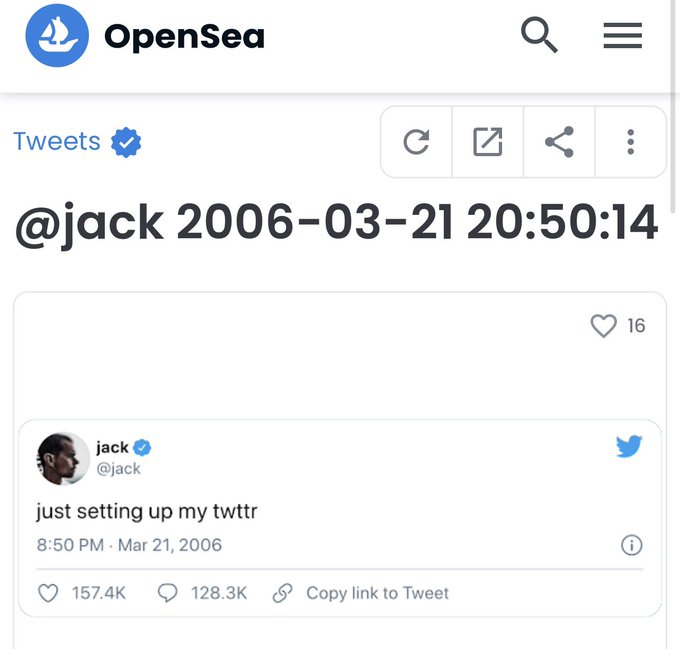Get rich overnight, everybody is doing it, so why not you? It’s so easy; it’s as if someone threw money from the sky and told you to pick it up off the ground. NFTs are a way to do just that.
You could be the proud owner of this exceptional digital collectible. The artist has described their NFT as follows: “Want to reach infinity? Buy this!” Needless to say, it doesn’t get more premium or exclusive than that. If you don’t have millions to spend on art but still want something collectible, start with a $2 million NFT.

While it might seem like buying a non-fungible token (NFT) is an instant, expensive win, that’s not always the case. Last month, an NFT by graphic designer Beeple sold for $69 million at an auction. The intellectual property world paused as a digital image of the first Tweet ever (purchased for almost $3mil) was set to auction for $48 million. The problem? The highest bid at the close of the auction was a measly $277. Whoopsy!
Unlike physical items, NFTs can’t be touched and often don’t have any material form. There is no tangible way to tell which NFT someone owns, so its value depends entirely on what the market decides. Some NFTs have been highly coveted (or at least widely talked about), like an imaginary digital cat that sold for almost $300,000 in 2017. But others have flopped.
The art market has a sexy new item: non-fungible tokens, or NFTs. These digital collectibles exist in the form of images or sound. They are housed on the blockchain, the same technology that underpins crypto coins like bitcoin. Some famous paintings have been digitized into NFTs, including works by American painter Andy Warhol and newer names such as LA artist Beeple—who sold a tokenized piece titled “the first 5000 days” for $69 million

Traditionally speaking, fungible assets are inter-substitutable, which implies that they are easy to exchange and are liquid in nature. A non-fungible token (NFT) represents a unique digital item and is authenticated on the blockchain. This means that NFTs can’t be replaced or substituted with a similar item.

What’s an NFT? In a nutshell, it’s a type of special crypto-currency that allows people to collect specific art or digital content in the form of tokens. These tokens are like certificates of authenticity for digital content, but the user doesn’t get to download the contents. Effectively, what they’re buying is unique proof that they’re the owner of something.
NFTs are unique digital creations like art, videos, music, tweets, or even exclusive real-world collectibles that have been tokenized and sold on a blockchain. For the uninitiated, consider an NFT as like a physical painting for which only one copy exists. Imagine if you could slice the image into individual pixels, then tokenize and sell those pixels on an Ethereum blockchain.
The pixel tokens will be individually stored on your computer’s Ethereum wallet and can be traded with other Ethereum enthusiasts. It is important to note that NFTs are not to be confused with cryptocurrencies like bitcoin or Ethereum—the currencies that power the blockchain technology networks on which these tokens are minted.
Don’t feel bad if you don’t understand Non-Fungible Tokens. It is complex to grasp, but its concept is relatively simple: it is a way for digital artwork and other collectible items to gain scarcity, which makes them valuable.
Cryptocurrency and NFTs are powered by blockchain, a decentralized ledger system. Bitcoin, Ethereum, and other cryptocurrencies run on networked computers that store the data uniquely. They’re all part of a network that verifies the realness of data without a central authority.

What’s a blockchain? In simplest terms, a blockchain is a time-stamped series of immutable data records managed by a cluster of computers not owned by any single entity. Each of these data blocks (i.e., block) is secured and bound to each other using cryptographic principles (i.e., chain).
The blockchain is a shared public ledger. Any and every transaction involving value and all computing that enables that transaction is recorded. It traces its origins to 2009 but has only gained mainstream attention over the last three years with the emergence of cryptocurrencies and bitcoin.
Bitcoin, the first and best-known cryptocurrency, was the first to bring blockchain technology into any kind of popular conversation and has been inextricably linked ever since. NFTs are another use for blockchain technology.
The blockchain is essentially a vast database that acts as a public ledger. For example, every transaction—buying an NFT—is recorded in the database and broadcast through a whole network of different computers. This gives the blockchain security because it’s virtually impossible to change information in this public ledger (hundreds or thousands of computers would have to be hacked at the same time).
Cryptocurrency and blockchain technology have recently caused a lot of debate, with their high volatility and the promise of decentralized finance.
Who regulates cryptocurrency, blockchain, and NFTs? It’s complicated. The lack of regulation has led to cryptocurrency scams, dubious initial coin offerings, and exploits in the Ethereum blockchain. – When the SEC or other government agencies take action, it can be devastating for a crypto project. For example, the EtherDelta CEO was fined $75,000 for running an unregistered securities exchange.
The laws of supply and demand regulate cryptocurrencies. At the same time, individuals rely on governments to regulate the currencies they use.
People aren’t paid in Bitcoin. They’re paid in dollars or kilos or whatever the local currency may be. When they buy something, they use that same currency. Governments can demand that cryptocurrencies are taxed, but there is no way to enforce the demands. Transactions listed on the blockchain can be clearly traced, but if people don’t use their legal names when exchanging goods for cryptocurrency, it’s impossible to track them.
‘Satoshi Nakamoto’ doesn’t mean anything to anyone outside the blockchain. On top of that, most governments want their citizens to use their national currencies; any ‘taxation’ on cryptocurrency is just an artificial addition to the price of items sold for crypto.


Reasonable skepticism about tokenized art and many of the other companies that make it possible is certainly in order as far as this writer is concerned. It is true that digital tokens are not worthless but if people decide to forgo traditional investments like real estate and stocks, which help fuel economic growth, in favor of collecting digital file cabinets, aren’t we willfully swallowing the blue pill?




The Intellectual Property Attorney you hire to represent you and your business is one of the most important decisions you will ever make.
These are the values that guide this firm:
Having a lawyer is often the difference between success and failure. A good intellectual property lawyer is priceless. Without one, you’re basically out in the cold on your own. I have seen so much go wrong for clients’ businesses and even personal finances apart from the company.
– Jerry K Joseph Esq. Founding Attorney


© 2023 Law Office Of Jerry Joseph. All Rights Reserved